Delhi High Court ordered Booking.com and Google to refrain from using the trademark words associated with MakeMyTrip as keywords
The court has given Google and Booking.com a week’s time to comply with the court order
The single-judge bench also deemed making MakeMyTrip bid for its own keywords to be ‘detrimental’ to its monetary interests
Inc42 Daily Brief
Stay Ahead With Daily News & Analysis on India’s Tech & Startup Economy
Providing interim relief to traveltech major MakeMyTrip, the Delhi High Court, through an order dated April 27, ordered Booking.com and Google to stop using the MakeMyTrip name and all the trademarks associated with it for Google Ads till the next hearing.
Inc42 has reviewed the order copy dated April 27, 2022.
The traveltech startup had filed a copyright infringement case against Booking.com and Google, alleging that the former had been illegally bidding on the trademarks associated with MakeMyTrip in Google Ads, which resulted in traffic and business being diverted to Booking.com from MakeMyTrip.
A single-judge bench of Justice Prathibha M. Singh deemed the use of MakeMyTrip’s trademark and its variations on Google Ads a passing off and ordered Google to stop offering it as a keyword for bidding.
“In view of the facts, orders and legal position as discussed above, this Court is prima facie of the opinion that the use of the Plaintiff’s registered mark ‘MakeMyTrip’ on the Google Ads Program as a keyword would amount to trademark infringement,” the court said.
The bench noted that prima facie, MakeMyTrip should be awarded the injunction, as not doing so will cause ‘irreparable injury’ to the traveltech startup.
“Under these circumstances, the Defendants [Google and Booking.com] are restrained from using the mark ‘MakeMyTrip’ together/in conjunction, with or without spaces for the purpose of using it as a keyword on the Google Ads Program till the next date of hearing,” the order read.
Justice Singh further clarified, “However, this shall not prevent the Defendants from using [the] words ‘make’, ‘my’, ‘trip’ not conjunctively on a standalone basis in a descriptive or generic sense on the Google Ads Program.”
The court has given Google and Booking.com a week’s time to comply with its order. The order will remain valid till the next hearing, and to the Indian territories only.
History Of The Dispute
The case was filed on the basis that Booking.com had been bidding for the keywords associated with MakeMyTrip for a long time.
MakeMyTrip issued a notice to Booking.com for the first time in 2019 to cease bidding on the keyword ‘makemytrip’ through the Google Ads Program. Following this, another cease-and-desist notice was issued to Booking.com in August 2020 for the same.
Both times, Booking.com stopped bidding for the keyword ‘makemytrip’ on Google Ads briefly and resumed doing it again. Booking.com refused to comply with the notice, citing a judgement by the European Commission in Case AT.40428-GUESS dated 17th December 2018.
The Guess judgement, however, was based on intra-brand advertising, and therefore was not valid as a precedent in the current case.
The court, during the course of the hearing, established what infringement was and what was not. In the end, the court deemed that using the keywords associated with the Indian traveltech startup, being called an ‘invisible’ use, was a misrepresentation.
“Thus, the “invisible” use of a mark as a keyword can constitute passing off as a matter of principle,” Justice Singh noted.
The court also deemed making MakeMyTrip bid for its own keywords to be ‘detrimental’ to its monetary interests and noted that Google could not stand to benefit from the company’s trademark, which MakeMyTrip has invested a lot of time and money in to develop its goodwill in the market.
All of this points to the issues that companies face in India in protecting their intellectual property and copyright infringement. Earlier, in a report, the United States Trade Representative (USTR) kept India on the priority watch list, saying that India remains one of the most challenging countries in terms of protection and enforcement of intellectual property.
In a compliance report, Google had said that it removed 93K pieces of content that were infringing on various copyrights in India, responding to 28,890 user complaints it received in February 2022.
{{#name}}{{name}}{{/name}}{{^name}}-{{/name}}
{{#description}}{{description}}...{{/description}}{{^description}}-{{/description}}
Note: We at Inc42 take our ethics very seriously. More information about it can be found here.


